CATHEDRAL QUEST
Our quest to experience the great cathedrals and churches of Europe
GERMANY 2007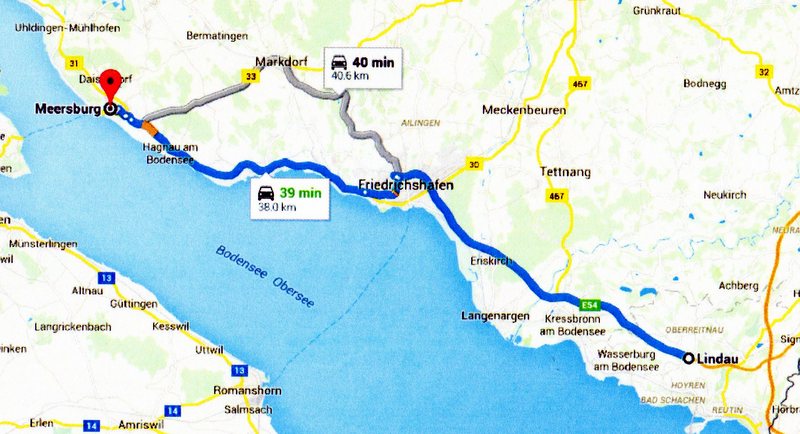
Day 10
THURSDAY, MAY 31
LINDAU TO MEERSBURG
We had breakfast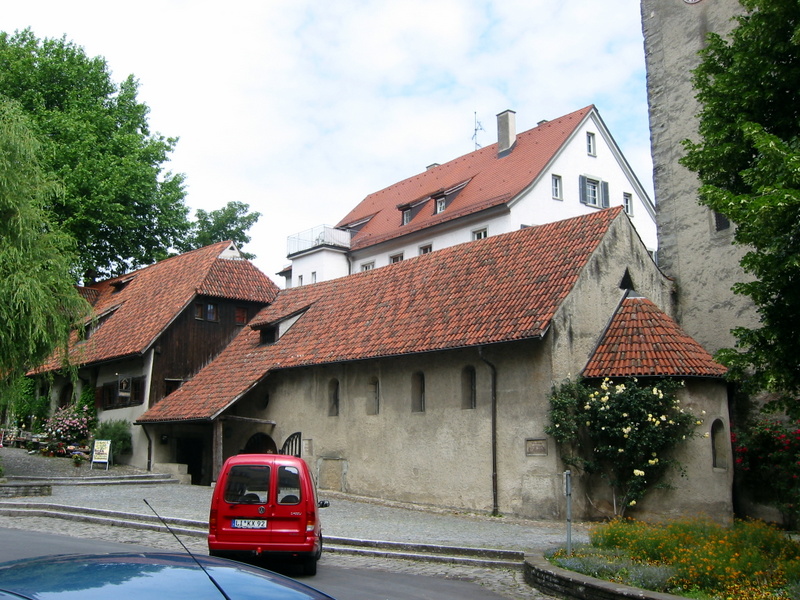 in Landauer Hof , our hotel. Breakfast was
included. My wife and I took our dirty clothes to a laundry. We had a hard time
communicating with the lady in charge. We stopped in a shop and bought
some gifts. Then we went to old St. Peter’s church which was a small
Romanesque structure with paintings by Hans Holbein.
in Landauer Hof , our hotel. Breakfast was
included. My wife and I took our dirty clothes to a laundry. We had a hard time
communicating with the lady in charge. We stopped in a shop and bought
some gifts. Then we went to old St. Peter’s church which was a small
Romanesque structure with paintings by Hans Holbein. 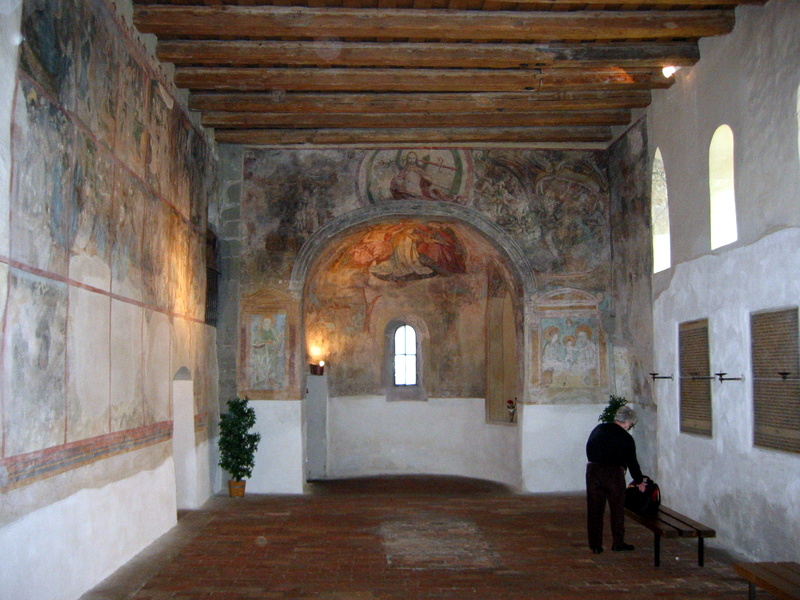 We met a couple
from Rhode Island who were Episcopalians. They went to St. Paul’s in Providence.
We met a couple
from Rhode Island who were Episcopalians. They went to St. Paul’s in Providence.
We found a McDonalds and had lunch, then got our car out of the parking
lot and drove to Meersburg. We wanted to see the castle and take the
ferry to Constance. There was no place to park down by the water. We
went back to the top and found a parking lot, some distance from the old
town and castle. We went to Meersburg Castle which looked just like
the
model.
MEERSBURG
CASTLE
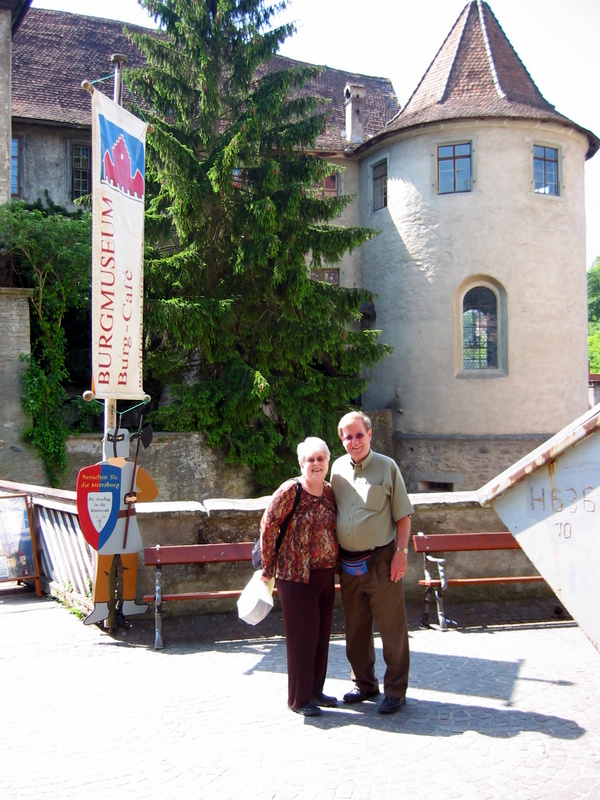 An old tale reports that the Merovingian king Dagobert I built the town
and fort at the beginning of the 7th century to guard the waterway to
and from Constance. The fort was destroyed by fire after Degobert
died, and was rebuilt 80 years later by Charles Martel, the grandfather
of Charlemagne.From 730-911 it was a Carolingian palace. In 911 castle
came under the Guelph rule until 1198. In 1213 Frederick II, the first
emperor who is known to have resided in the castle, lived in for a time.
In 1268 the castle reverted to Diocese of Constance until the
Secularization in 1803. Forty four bishops ruled in succession as lords
of the castle and until 1526 it served as a summer palace. The bishops
stayed there until the early 1700s, when the New Palace (Neues Schloss)
was built nearby Joseph Freiherr von Laßberg acquired Meersburg Castle in 1837.
During this time, the castle was used as an artists’ colony. The German
poet, Annette von Droste-Hülshoff, Laßberg’s sister-in-law, visited the
castle often, and died there in 1848. Laßberg died in 1855. His heirs
couldn’t maintain it. It was then sold to Dr. Karl Mayer von Mayerfels
who restored it. Dr. Mayerfels died in 1883 and his descendants preserve
the castle to this day.
SEE MY MODEL OF MEERSBURG CASTLE.
An old tale reports that the Merovingian king Dagobert I built the town
and fort at the beginning of the 7th century to guard the waterway to
and from Constance. The fort was destroyed by fire after Degobert
died, and was rebuilt 80 years later by Charles Martel, the grandfather
of Charlemagne.From 730-911 it was a Carolingian palace. In 911 castle
came under the Guelph rule until 1198. In 1213 Frederick II, the first
emperor who is known to have resided in the castle, lived in for a time.
In 1268 the castle reverted to Diocese of Constance until the
Secularization in 1803. Forty four bishops ruled in succession as lords
of the castle and until 1526 it served as a summer palace. The bishops
stayed there until the early 1700s, when the New Palace (Neues Schloss)
was built nearby Joseph Freiherr von Laßberg acquired Meersburg Castle in 1837.
During this time, the castle was used as an artists’ colony. The German
poet, Annette von Droste-Hülshoff, Laßberg’s sister-in-law, visited the
castle often, and died there in 1848. Laßberg died in 1855. His heirs
couldn’t maintain it. It was then sold to Dr. Karl Mayer von Mayerfels
who restored it. Dr. Mayerfels died in 1883 and his descendants preserve
the castle to this day.
SEE MY MODEL OF MEERSBURG CASTLE.
We found a McDonalds and had lunch, then got our car out of the parking lot and drove to Meersburg. We wanted to see the castle and take the ferry to Constance. There was no place to park down by the water. We went back to the top and found a parking lot, some distance from the old town and castle. We went to Meersburg Castle which looked just like the model.
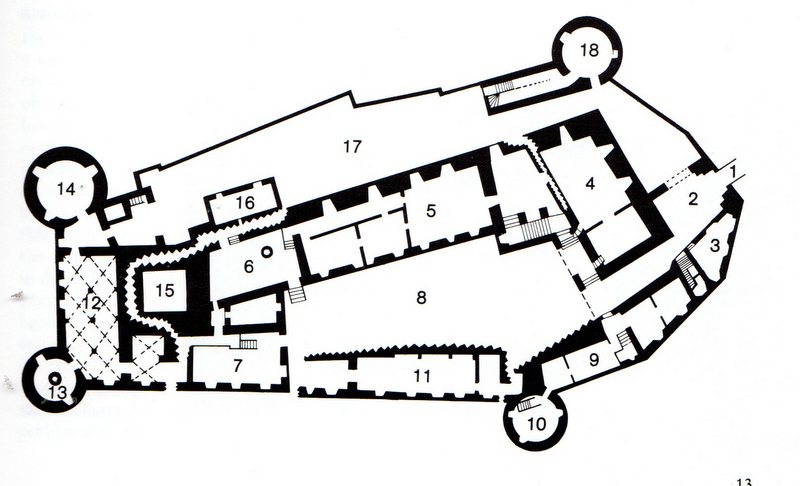 A
self walking tour
took us in every room. Each room was furnished with period pieces.
The first room that we passed into was called the Durnitz -
formerly called the guard room (#4 on the floor plan), a low chamber almost at ground level with two small
windows overlooking
A
self walking tour
took us in every room. Each room was furnished with period pieces.
The first room that we passed into was called the Durnitz -
formerly called the guard room (#4 on the floor plan), a low chamber almost at ground level with two small
windows overlooking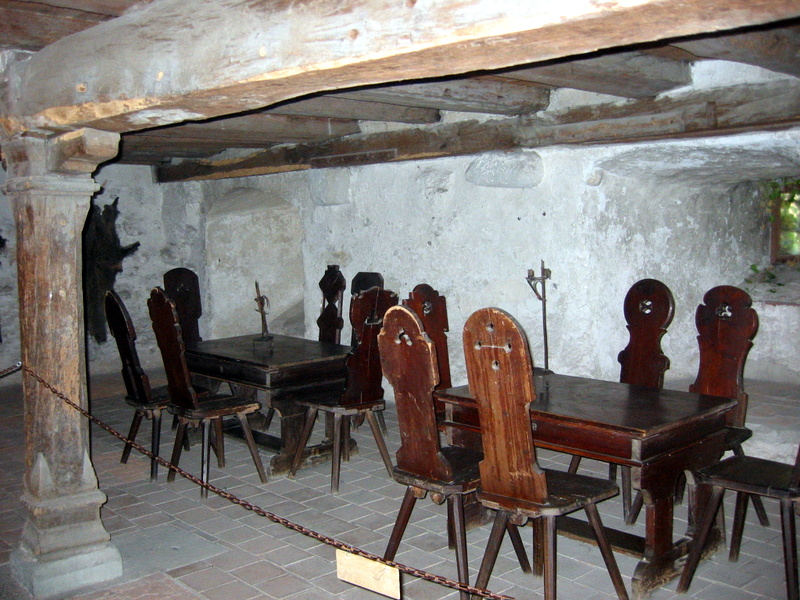 the entrance. This was an interesting room which has retained its rugged
Merovingian masonry and ancient beam ceilings. The ceiling construction
rest on a joist in the middle which is supported by an octagonal wooden
pier with bolster. The beam along the wall lies on so-called wall
plates, and these in turn rest on corbels of natural stone which have
remained virtually unworked.
the entrance. This was an interesting room which has retained its rugged
Merovingian masonry and ancient beam ceilings. The ceiling construction
rest on a joist in the middle which is supported by an octagonal wooden
pier with bolster. The beam along the wall lies on so-called wall
plates, and these in turn rest on corbels of natural stone which have
remained virtually unworked.
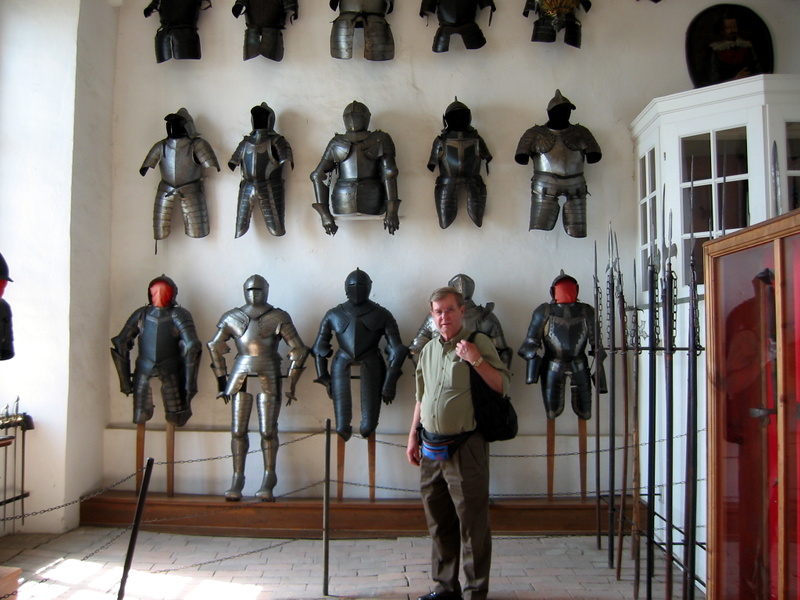 The
Hall of Arms (#7) was built in the 16th century and altered in the 18th
century. It was formerly a practice room for fencing and other military
exercises but now contains a display of arms and armor. The armor dates
from 1570 – 1680.In the foreground of the picture is Sir Thomas of Clay
who was looking for a new suit of armor.
The
Hall of Arms (#7) was built in the 16th century and altered in the 18th
century. It was formerly a practice room for fencing and other military
exercises but now contains a display of arms and armor. The armor dates
from 1570 – 1680.In the foreground of the picture is Sir Thomas of Clay
who was looking for a new suit of armor.
The Hall of the Knights (#11) dates from the time of the
Hohenstaufens (13th century). Its plainness reflects th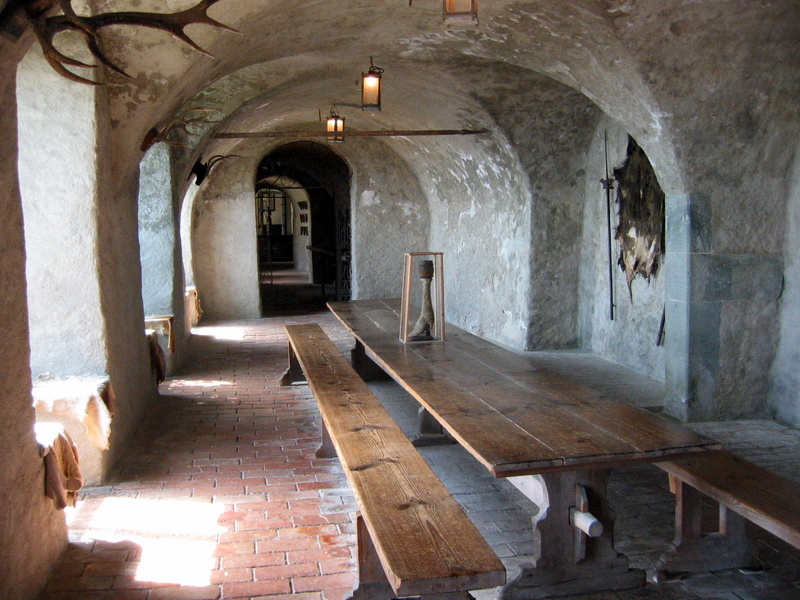 e
simplicity of the age. On the walls are deer skins, hunting trophies and
weapons. The trestles and benches were carried into the room for meals
and removed again afterwards. In a glass case on the table was a deer
hoof and leg with a small drinking mug attach to the top.
e
simplicity of the age. On the walls are deer skins, hunting trophies and
weapons. The trestles and benches were carried into the room for meals
and removed again afterwards. In a glass case on the table was a deer
hoof and leg with a small drinking mug attach to the top.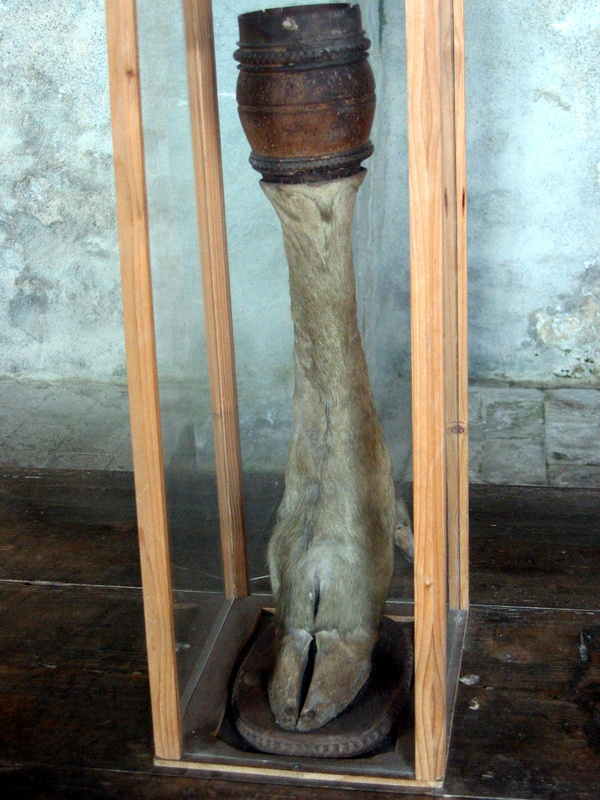 It sure didn't look very appetizing
It sure didn't look very appetizing
We visited all of the rest of the rooms including a Chapel in a small
tower near the entrance/exit. The Chapel was furnished in
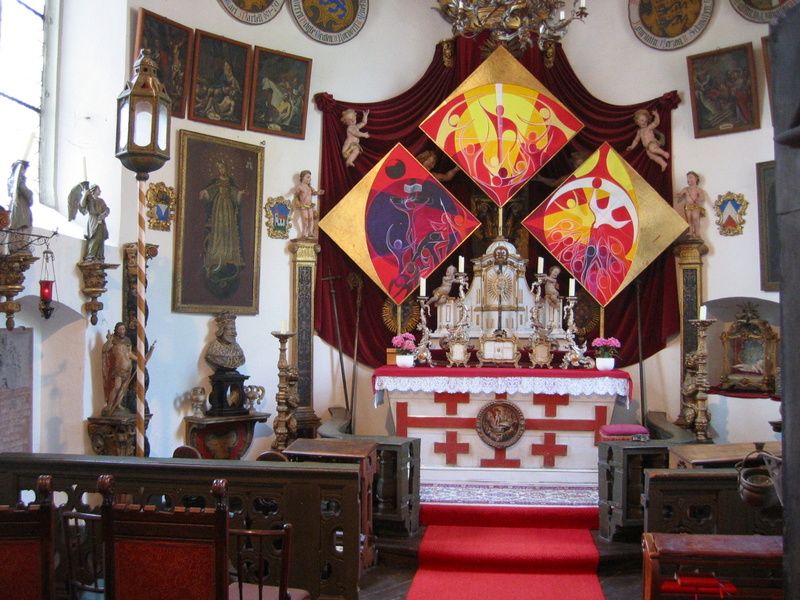 1658.
It contains a number of objects of art including a figure of Mary and beautifully carved Baroque
angels which are ascribed to Michael
Zurn the younger.
1658.
It contains a number of objects of art including a figure of Mary and beautifully carved Baroque
angels which are ascribed to Michael
Zurn the younger.
The Castle also had a dungeon which could be seen down a deep hole.
After a very enjoyable visit in the Castle,we s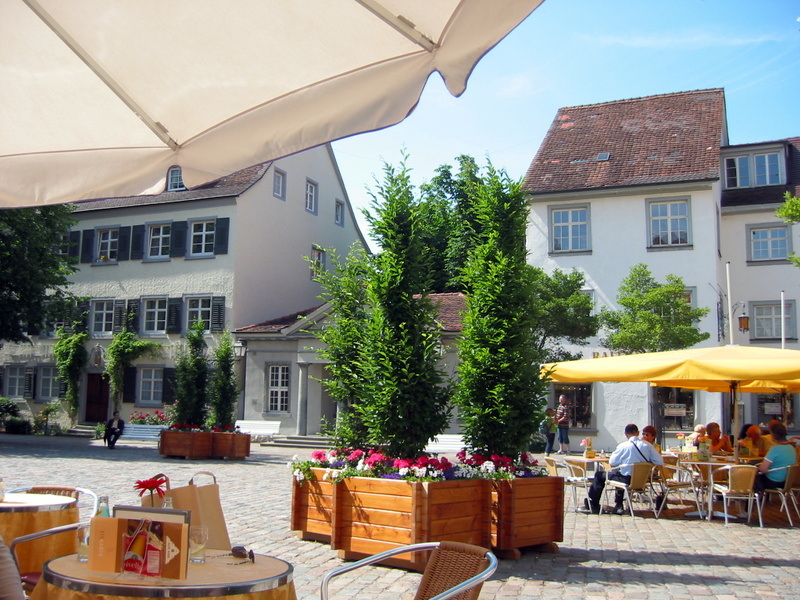 topped in the square for drinks and did some shopping.
topped in the square for drinks and did some shopping.
We drove
back to Lindau. They had reserved a space in their garage for us, which was
a few blocks from the hotel. A young lady on the staff went with
me to show me where to park. We had drinks on our terrace/balcony. The
view was unbelievable.
Went out fo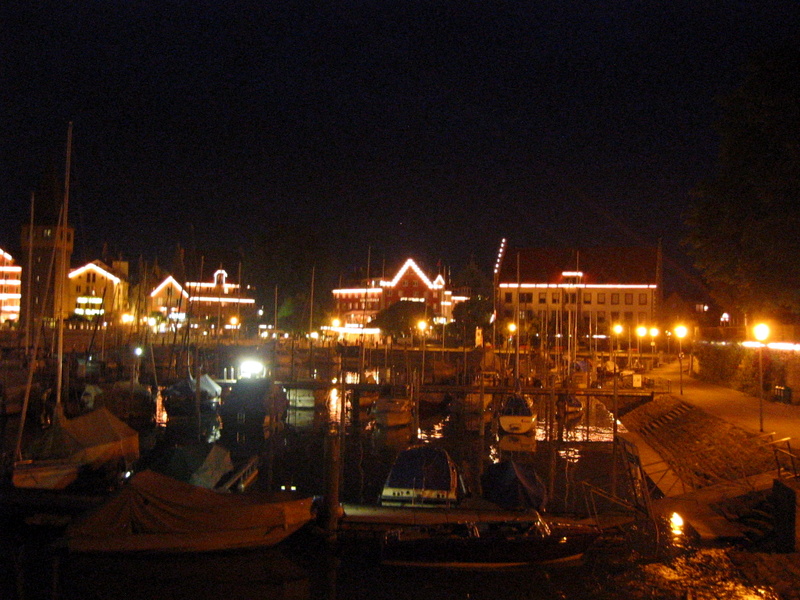 r a walk and decided to eat at the Hotel Helvetia which was
near our hotel. We had fish for two which was delicious. We walked a
little on the sea wall but it started to rain.
r a walk and decided to eat at the Hotel Helvetia which was
near our hotel. We had fish for two which was delicious. We walked a
little on the sea wall but it started to rain.
